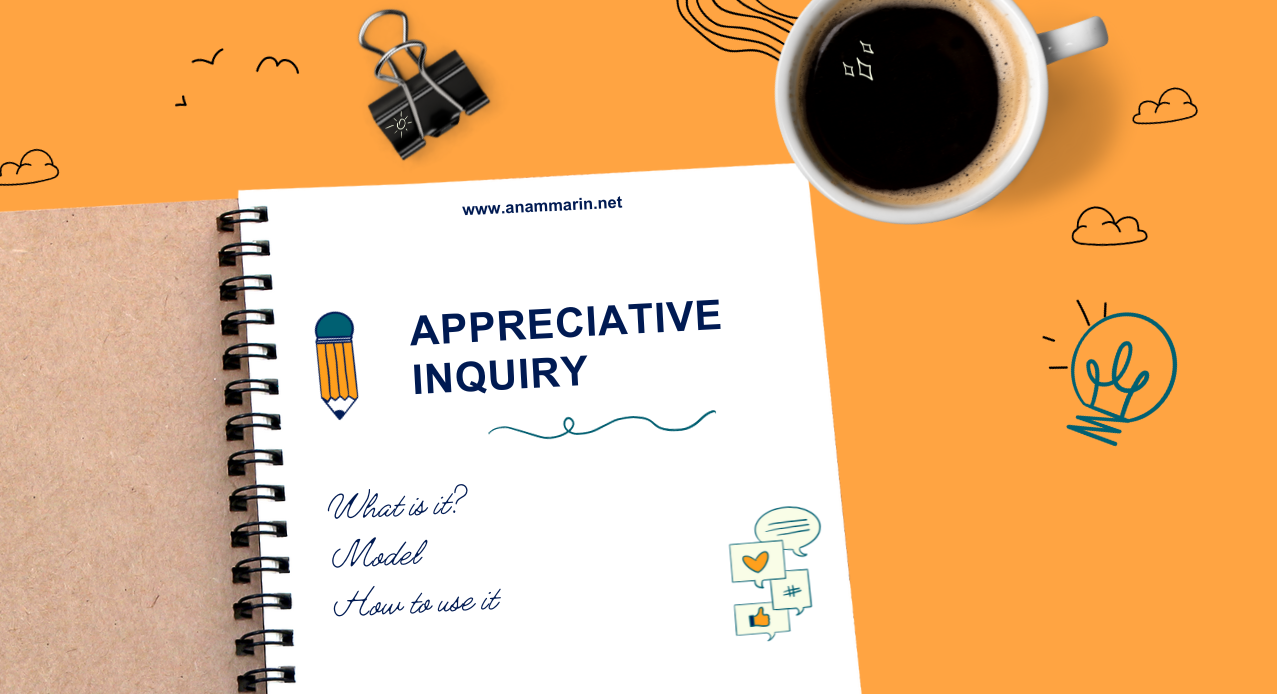What is Appreciative Inquiry
“Our conversations are fateful. What we think, say, and do influences every moment in our lives.”
― Jackie Stavros
Since I study for my Mentoring Accreditation there are a lot of materials to study and to go through study cases on different approaches that have a coaching/mentoring approach in one to one or team/group coaching. Among those there is a full chapter dedicated to Appreciative Inquiry, a great tool for coaches, education and NGO professionals. I felt inspired to research more on the topic because I believe that it can be included in team coaching processes, and also it can support groups to move from a fixed to a growth mindset.
Appreciative Inquiry is a philosophy and methodology for organizational development that was elaborated by David Cooperrider and Suresh Srivastva in the 1980s. At its core, AI is a shift away from the traditional problem-solving mindset towards a focus on exploring and enhancing an organization's strengths, values, and successes. The wow moment came to Cooperrider during a research for an organizational development project where they faced hostile and negative atmosphere and changed from questioning what was not working to what was working for a different company.
From an organizational point of view AI Model is one of the key positive approaches to collective learning and development of people. The approach is strengths based with a positive touch to the leadership and organizational change. Appreciative Inquiry is built on the belief that organizations grow in the direction they inquire, so by asking positive and forward-looking questions, they can foster positive change.
It can be used by individuals, teams, organizations, and at the society level, it is a great way to move people toward a common vision for the future, at any level applied. The key in this is asking open questions, a safe space to express opinions and make people feel listen and heard, as individuals but also as a group. There are 3 concepts that apply through all the process - appreciation, inquiry, and wholeness.
The model that you can model an AI transformation is called 4D and consists in 4 stages and it can be applied with 10, 100 or 1000 people, it offers a visual representation of an AI initiative. You can use post-its or a collaborative online whiteboard like Mural or Miro.
Discovery: In this phase, participants discover ”the best of what is” identifying and discussing the organization's strengths, values, best practices and achievements. This step is all about understanding what is working well and what makes the organization successful. The Discovery is a great way to hone on past successes and what enabled them. A shift from the current mindset and vocabulary towards focused thinking.
Dream: Participants are encouraged to imagine a positive future. With a bigger number of participants you will benefit from wider range of opinions, perspectives and ideas. This is the step where you invite the participants to imagine what the organization could look like at its best, focusing on possibilities and aspirations, they will respond to ”what could be?”
Design: This stage continues the co-creation and involves the development of action plans and strategies to turn the dreams into reality, the focus shifts to discussing the possibilities that were generated at the Dream Stage. It's about creating concrete steps for achieving the envisioned future. ”What should be?” is the question that is asked to the participants in an invitation to reach a shared vision that the team can see it as having real and positive potential. It is important here to create a safe space where everyone can share and feel listen and heard.
Destiny (or Delivery): In this final phase, the organization implements the action plans and monitors progress. It's where the positive change is translated into everyday practices through innovation and actions. ”What will we do?” What was designed now finds possible means of achieving it with individual commitment. There is a lot of improvisation around this phase.
With a real need on the market of a formal methodology on AI Professor Cooperrider and Dr. Diana Whitney from Taos Institute developed 5 principles for AI practitioners: the Constructionist, The Simultaneity, Poetic, Anticipatory and the Positive - and even there is a great temptation on writing on these as well some things you can discover on your own if you feel inspired by what you read here.
Appreciative Inquiry is a powerful approach to organizational development that harnesses the strengths and positive aspects of an organization to drive meaningful and lasting change. By engaging employees, fostering a culture of creativity, and promoting open and constructive communication, AI offers as I see it a range of benefits that can transform organizations and propel them toward a brighter future. Embracing AI is not just a strategy; it's a shift in mindset that can empower organizations to reach their full potential.
